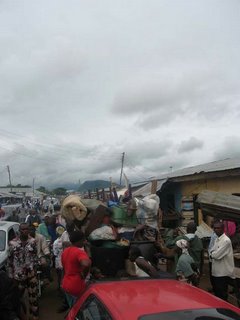 A muscular youth ran in front of our car toward the tight group of uniformed mobile police. Half his face was painted white. He looked straight out of one of the pictures I’d seen of the Movement for the Emancipation of the Niger Delta. It was only then driving past the row of shops that were scheduled to be demolished in Gwarimpa that I had any nerves about going there.
A muscular youth ran in front of our car toward the tight group of uniformed mobile police. Half his face was painted white. He looked straight out of one of the pictures I’d seen of the Movement for the Emancipation of the Niger Delta. It was only then driving past the row of shops that were scheduled to be demolished in Gwarimpa that I had any nerves about going there.Staring out of Austin’s Mercedes I could see the two bulldozers parked right in the middle of the line of shops. All around there were piles of merchandise taken from the stores waiting to be picked up into heavy duty trucks. Shop keepers were in the process of stripping their shops of all salvageable fittings, building materials and stock, leaving chipped concrete shells. The crowd was gathering around the bulldozer and we had to nudge our way through.
Lola was sitting next to me in the car. She was coming back to pack up all her belongings before the bulldozers came to her door. This is the second time she has had her home destroyed. Last year her home on the Airport road was demolished. I’ve spoken to people who have been bulldozed out of their homes three times in the last two years.
Leaving Austin’s car the street we walked down was filled with trucks, busses, okada motorcycles, boxes, bags, m
 attresses, piles of wood, corrugated tin, scrap metal. Groups of women stood clustered in the street, looking at all the fleeing masses. We spoke to a few people who were packing all their things into cars.
attresses, piles of wood, corrugated tin, scrap metal. Groups of women stood clustered in the street, looking at all the fleeing masses. We spoke to a few people who were packing all their things into cars.The muddy street was churned up by the traffic. Vegetables, fruit, unfortunate chickens, rats, and piles of dry gari were crushed into the copper coloured mud by the trucks.
The estate of Gwarimpa sprang up around the village which was there before Abuja existed. Labourers and office workers arriving in Abuja rented shacks built by private landlords given land title under the military regimes of Babangida and Sani Abacha. The administration of the Federal Capital Territory did not pay any attention to the original “masterplan” of the city. The current administration of Nasir el-Rufai has been determined to return to the original zoning contained in the 10-year-old plan. Unplanned villages are being torn down. The land is being parcelled up and sold for residential, office or commercial use. Or maybe a road was supposed to go through it. But in Gwarimpa the tribal villagers have a copy of the original masterplan. There is no road coming through the area, no residential houses planned for it, no commercial district. There is simply a space market “village”.
Yakubu the village English speaker said the city authorities had come the day before and begun marking houses for demolition. “They claimed our chief knew about it, but he didn’t. We chased them away. They only marked the houses of latecomers, but we are worried they will come back and demolish ours too.”
The city authority has termed these people “indigenes”, and has started a resettlement programme for them. But “non-indigenes” are angry.
“I’ve heard they have turned down the apartments they were offered because they all have three wives and the rooms are too small” said one.
“Aren’t we all indigenes of Nigeria?” said another distraught civil servant.
We tried to get to the indigene chief but could not. He was required by the city authorities to show them which houses they could pull down, and which belonged to his people. The director of the Federal Housing Association was there. But police prevented me from approaching her to ask questions.
Coming up to one of the bulldozers I stopped to take a photo. I looked at the screen of the camera, It was a white out. I’d missed it. I stuck my hand up again and took another shot. Too late, the police noticed me this time. They came to me and tried to take my camera. But a man who had earlier interrupted our interview with the indigenes to ask my name, came up and told the police to go. This wo
 rried me slightly. My colleague Abubakar said there were many Secret Service agents around.
rried me slightly. My colleague Abubakar said there were many Secret Service agents around.The police clambered over one of the bulldozers and it departed to the next village. The village chief had bought the residents of Gwarimpa a day to collect their belongings by offering to help demolish the neighbouring village shops in Kado.
We followed on.
When we arrived at Kado, we could see the huge fat wheels of the tractor ramming through the row of shops. A huge crowd had gathered, more shopkeepers ripping out anything they could, standing on the grass verge with their things in piles. Looters grabbed what they could from the wreckage. We walked in form the back of the village. I saw a man in his late forties or early fifties carrying a heavy oil-drum barbeque up the hill. He placed it down next to a group of women in wax print dresses, and returned with a table that must have weighed 200lbs balanced on his head, his face contorted with pain.
Trying to get pictures of th
 e bulldozer close up was difficult. Abubakar worried and fretted at my side. “Don’t snap now!” he said “they are watching you!” But I didn’t want to leave without a good close up.
e bulldozer close up was difficult. Abubakar worried and fretted at my side. “Don’t snap now!” he said “they are watching you!” But I didn’t want to leave without a good close up.We jumped in a cab and drove past where the piglike tractor rammed through the shops, I snapped a man who had grabbed the only thing he could from his shop, or looted from another, a desk fan.
Its taken me a week to write this, as I haven’t been able to straighten it all in my mind.


0 Comments:
Post a Comment
<< Home